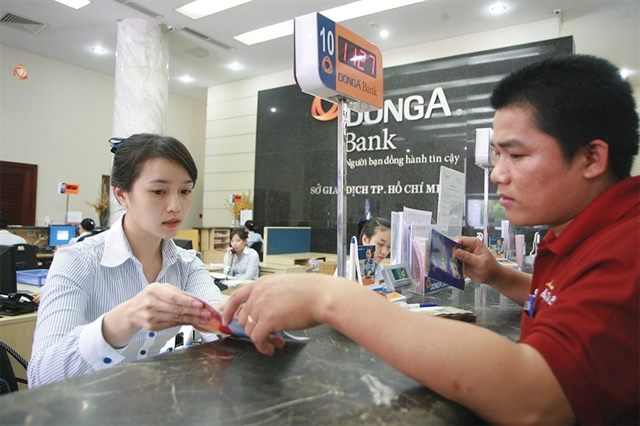|
Bank transfers lead to rebranding phase
Vietnam’s banking landscape is being reshaped by mandatory transfers, marking a pivotal step in stabilising weak banks and strengthening the sector.

DongA Bank could be close to a similar transfer, as urged by the government, photo Le Toan
|
Last week, troubled lender Oceanbank announced a transformative phase, with plans for rebranding and new leadership following its compulsory transfer to Military Bank (MB). MB, which took over the struggling zero-VND bank nearly a month ago, has outlined a strategic roadmap to revitalise the institution.
Starting December 18, Oceanbank will be renamed Vietnam Modern One Member Limited Liability Commercial Bank (MBV). In addition to the rebranding, MB has appointed senior executives to key leadership positions at MBV. MB personnel assumed the roles of chairman and general director from December 10.
This development comes on the heels of a historic milestone in October, when Vietnam successfully executed two mandatory banking transfers under a newly introduced mergers and acquisitions (M&A) framework.
Besides the OceanBank-MB deal, Vietnam Construction Bank was transferred to Vietcombank. The framework, made possible by the amended Law on Credit Institutions which took effect in July, provided the legal foundation for these complex transactions.
Assoc. Prof. Dinh Trong Thinh said, “The new regulations not only safeguard depositors’ rights but also protect shareholders and customers at acquiring banks. However, addressing the challenges of weak banks post-transfer could take 7-10 years.”
Following these transfers, MB and Vietcombank are exploring various strategies for their newly acquired banks. Options include full integration into parent operations, maintaining them as independent subsidiaries, or transferring them to new investors.
Concurrently, the government has urged the State Bank of Vietnam to expedite similar transfers for other underperforming banks, such as GPBank and DongA Bank, with deals anticipated to close by the end of the year. Other banks, including VPBank and HDBank, have also announced plans to acquire struggling institutions, reflecting the government’s commitment to stabilising the sector.
At VPBank’s AGM in April, deputy CEO Pham Thi Nhung said, “We are fully prepared to mobilise our resources and will begin restructuring the acquired bank immediately after the transfer is completed.”
While domestic investors dominate Vietnam’s banking M&A market, foreign participation remains limited. Notable domestic transactions include Thanh Cong Group’s acquisition of a 40 per cent stake in PGBank through affiliated companies in April 2023, and Gelex Group’s purchase of a 10 per cent stake in Eximbank earlier this year.
Foreign investor involvement has faced hurdles, with key deals being delayed. Both BIDV and Vietcombank postponed plans to raise $1 billion each through private placements to international investors, shifting their targets to 2025. Vietcombank remains committed to its private placement strategy, although progress has been slower than anticipated.
Meanwhile, Techcombank is actively seeking a foreign strategic partner for a 15 per cent stake.
Speaking to Bloomberg TV in November, CEO Jens Lottner said, “Techcombank, as Vietnam’s largest publicly listed private bank, has always prioritised strategic partnerships. While we previously sought investors to strengthen our capital base, we are now focused on acquiring expertise, particularly in technology and access to trade corridors. A 15 per cent stake is a figure we are realistically considering offering to the right partner.”
VIR
|